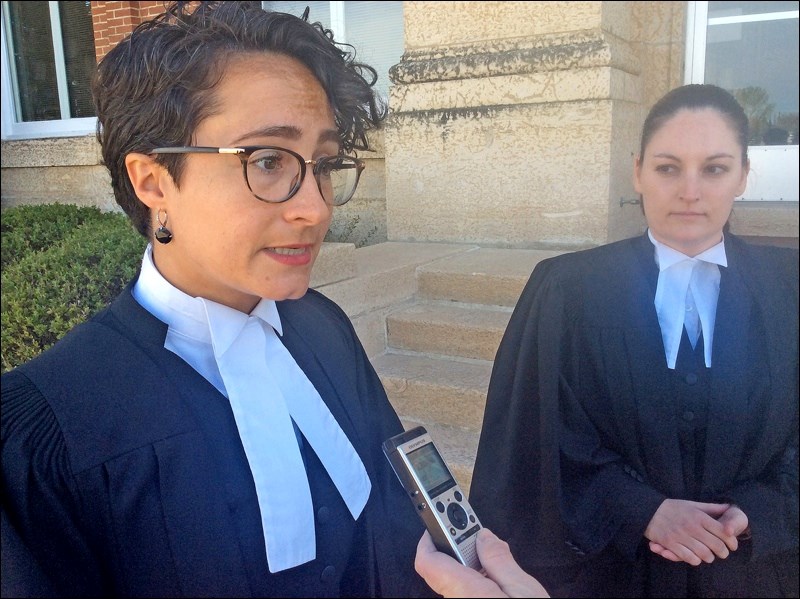It was a lengthy prison sentence imposed on Tristan Pinder in Battleford Queen’s Bench Court on Thursday.
Pinder received a total sentence of 13 years, less remand credit of 20 months, in connection to charges stemming from April 2018 in Regina and in the northwest Saskatchewan region.
For the charge from Regina of robbery, Justice Gerald Allbright imposed a term of seven years consecutive to the other counts. The robbery charge was in connection to the stealing of a taxi van in Regina in which the cab driver was stabbed.
For the charge of intent to prevent arrest by discharging a firearm at an RCMP constable it was seven years consecutive, for flight from police it was two years consecutive, and for stealing gasoline from Lashburn it was 30 days concurrent.
These other charges were in connection to a series of incidents along Highway 16 in northwest Saskatchewan, which ended with a shooting standoff with police near Delmas on April 14, 2018.
The total penitentiary time added up to 16 years, but Allbright determined the “totality principle” applied to reduce the amount of time Pinder would serve. Allbright expressed concern that an overly long offence would be “crushing” to Pinder, and to his willingness to deal with rehabilitation.
After applying the totality principle, the global sentence came to 156 months, less remand time credited at 597 days or 20 months. That means Pinder’s sentence runs 136 months commencing from Thursday.
Allbright also made a weapons prohibition order against Pinder of 18 years, and an order prohibiting Pinder from obtaining prohibited weapons for life. A DNA order was made and a driving ban of two years was also imposed. A forfeiture order was also issued.
Pinder was calm inside the courtroom as Allbright imposed sentence. This had been the second of two days set aside for the sentencing, with Pinder’s counsel Ian Mokuruk making defence submissions Thursday.
Counsel had varied when it came to their submissions to the judge on the range of sentence to Pinder.
For robbery, the Crown had called for six to eight years, the defence two to four years. On the discharge of firearms charge the Crown sought nine years consecutive while the defence sought six years. On the flight charge, the Crown sought two years, the defence one year.
In the end, Allbright came up with a sentence somewhere in the middle.
Afterwards, the Crown indicated they were satisfied that the case had been resolved.
“I’m very pleased that we were able to come very speedily to what I think is a very fair and just outcome for a very serious set of facts,” said Crown Prosecutor Charlotte Morden.
The other charges, including the charge of attempted murder in connection to the Regina stabbing incident, were withdrawn. In speaking to reporters, Crown Prosecutor Alexandra Findlay said that the robbery guilty plea “also properly captures the entire circumstances of the Regina aspect of this offence.”
In imposing sentence, Justice Allbright noted the court had to be aware of the circumstances of the offence, and consider the personal circumstances of the offender. He called the indictments “incredibly serious criminal offences.”
With respect to the facts of the case, which transpired over a number of days, Justice Allbright described what transpired in the northwest as a “Bonnie and Clyde escapade.” Pinder was the driver of the stolen taxi vehicle and Verena Petruka, the co-accused in the case, was the passenger.
Allbright noted the shots fired by Pinder at the RCMP constable, which hit his windshield, could have been “lethal if not fatal.”
The judge also noted Pinder and Petruka “made that good decision to surrender,” and give statements to police.
Allbright referred to the victim impact statement of the cab driver Muhammad Umar, who described what transpired as the “worst day of my life.” Allbright also described the trauma of the RCMP constable who was shot at, with the window of his police vehicle being struck by gunfire.
These were extremely serious matters, said Allbright, but “that is only one part of the equation.”
There were several mitigating factors, a significant one being the “early entry of the guilty pleas,” said Allbright. That took away the need for the Crown to call those witnesses.
Allbright also noted the rehabilitation prospects of the accused. In the case of Pinder, the Queen’s Bench judge said there was an excellent possibility of rehabilitation and “redemption.”
He said Pinder was “candid” in co-operating with the pre-sentence report, which pointed to a long history of drug use, in particular crystal meth.
He began smoking weed and was using crystal meth a few times a week, and “that was a harbinger or what brought him in to court today,” said Allbright.
Allbright noted the impact of crystal meth was one he had seen in court before.
“Crystal meth has been the unseen scourge in the courtroom but nonetheless present,” he said.
Allbright expressed his hope to Pinder that he would focus his time in prison on “becoming a better you.” But as he wrapped up, the judge gave one final warning to Pinder: that the worst thing Pinder could do in prison was maintain gang affiliations.
“Being involved in a gang would achieve no purpose whatever, it can only hurt you,” Allbright told Pinder.



